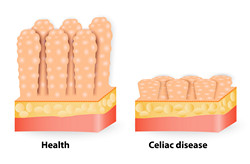A novel angle on coeliac disease
CD is a common hereditary autoimmune disorder associated with destruction of the small bowel mucosa. CD patients present with autoantibodies against transglutaminase 2 (TG2), an enzyme involved in angiogenesis, and disruption of the intestinal vasculature. The scope of the EU-funded TRANSVASCED (Celiac disease autoantibodies targeted against transglutaminase 2: repercussions in vascular biology, disease pathogenesis and treatment) project was to study the in vivo role of coeliac type antibodies on vascular biology and functionality. To achieve this, scientists inoculated a group of mice with coeliac type antibodies or controls and observed vascular development. Using electron microscopy, they studied the endothelial joints and vascular integrity of the vessels, and evaluated the capacity of the lymphocytes to transmigrate across the vessel walls. They also monitored the impact of CD antibodies on TG2 enzymatic activity and extracellular matrix composition. Their observations indicated that antibodies derived from coeliac patients inhibit angiogenesis in vivo by reducing the activity of TG2. Proteomic analysis showed that this inhibition was concomitant with higher levels of the protein RhoB in endothelial cells. An additional twelve candidates were selected for further analysis. Silencing of RhoB rescued the anti-angiogenic effect elicited by the antibodies, thereby opening a window for therapeutic interventions. Similar effects were observed with the administration of statins, drugs that modulate RhoB. Additional analysis of patient samples in comparison to healthy subjects led to the identification of four candidate proteins with prognostic value. Collectively, the results of the TRANSVASCED study provide significant insight into the pathobiology of CD. Equally important is the therapeutic angle of the work that proposes early disease biomarkers as well as treatment alternatives to a gluten-free diet.
Keywords
Coeliac disease, biomarker, autoantibodies, transglutaminase 2, RhoB, endothelial cells

